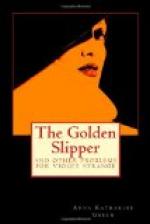The doctor is settling into a deep melancholy, from which he tries to rise at times, but with only indifferent success. Yesterday he rode around to all his patients for the purpose of withdrawing his services on the plea of illness. But he still keeps his office open, and today I had the opportunity of witnessing his reception and treatment of the many sufferers who came to him for aid. I think he was conscious of my presence, though an attempt had been made to conceal it. For the listening look never left his face from the moment he entered the room, and once he rose and passed quickly from wall to wall, groping with out-stretched hands into every nook and corner, and barely escaping contact with the curtain behind which I was hidden. But if he suspected my presence, he showed no displeasure at it, wishing perhaps for a witness to his skill in the treatment of disease.
And truly I never beheld a finer manifestation of practical insight in cases of a more or less baffling nature. He is certainly a most wonderful physician, and I feel bound to record that his mind is as clear for business as if no shadow had fallen upon it.
Dr. Zabriskie loves his wife, but in a way torturing to himself and to her. If she is gone from the house he is wretched, and yet when she returns he often forbears to speak to her, or if he does speak it is with a constraint that hurts her more than his silence. I was present when she came in today. Her step, which had been eager on the stairway, flagged as she approached the room, and he naturally noted the change and gave his own interpretation to it. His face, which had been very pale, flushed suddenly, and a nervous trembling seized him which he sought in vain to hide. But by the time her tall and beautiful figure stood in the doorway, he was his usual self again in all but the expression of his eyes, which stared straight before him in an agony of longing only to be observed in those who have once seen.
“Where have you been, Zulma?” he asked, as contrary to his wont, he moved to meet her.
“To my mother’s, to Arnold & Constable’s, and to the hospital, as you requested,” was her quick answer, made without faltering or embarrassment.
He stepped still nearer and took her hand, and as he did so my eye fell on his and I noted that his finger lay over her pulse in seeming unconsciousness.
“Nowhere else?” he queried.
She smiled the saddest kind of smile and shook her head; then, remembering that he could not see this movement, she cried in a wistful tone:
“Nowhere else, Constant; I was too anxious to get back.”
I expected him to drop her hand at this, but he did not; and his finger still rested on her pulse.
“And whom did you see while you were gone?” he continued.
She told him, naming over several names.
“You must have enjoyed yourself,” was his cold comment, as he let go her hand and turned away. But his manner showed relief, and I could not but sympathize with the pitiable situation of a man who found himself forced into means like this for probing the heart of his young wife.




